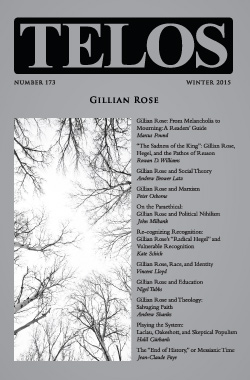By Jack Robert Edmunds-Coopey · Wednesday, October 3, 2018 As an occasional feature on TELOSscope, we highlight a past Telos article whose critical insights continue to illuminate our thinking and challenge our assumptions. Today, Jack Robert Edmunds-Coopey looks at Damien Booth’s “Hegel’s Philosophy of Physics and Kant’s Noumena” from Telos 179 (Summer 2017).
Damien Booth’s article “Hegel’s Philosophy of Physics and Kant’s Noumena” addresses Hegel’s critique of Kant concerning the positing of the noumena, the realm beyond the sensible, which for Hegel results in entanglements and contradiction, Kantian antinomies that the dialectic could resolve. While the article appears to be an exposition of the contradiction of Kant’s noumena and its critique in Hegel, Booth turns to Adorno and Heidegger to accentuate the relevance of Kant’s modern project of philosophy and Hegel’s critique.
Continue reading →
By Brent Ranalli · Thursday, May 12, 2016 Adam Smith is usually remembered as a champion of commerce. But as a moral philosopher he understood that even as commerce inculcates the virtues of industry, frugality, and temperance, it also inculcates vices such as avarice, envy, and short-sighted self-centeredness. Smith recognized that good government requires virtues such as honor, moral rectitude, patriotism, magnanimity, and a far-sighted perspective, to which the commercial vices are fairly opposed. Smith considered this a problem in his own day, as Great Britain was threatening to become a nation of shopkeepers, ruled by classes trained not in statesmanship but in commerce, governed not by codes of honor but by self-interest. The problem has resonance today as well.
Continue reading →
By Andrew Shanks · Tuesday, February 2, 2016  Gillian Rose began as a sympathetic interpreter of Adorno. This essay considers the abiding strength of Adorno’s thought, from her point of view, by contrast for instance with that of Heidegger; but also the rationale of her eventual move beyond Adorno, and back to Hegel. Fundamentally at issue, in this move, is the Hegelian notion of “Absolute Knowing,” as a systematic re-opening of the most purely rationalistic philosophy, toward theology. That is, the sense in which it represents an ideal “salvage” strategy, with regard to religion: neither over-reductionist in the manner of Kant, or of Feuerbach, nor inadequately critical in the manner of Schleiermacher; but, rather, an approach precisely focused on the ineradicable ambiguity of all religious utterance—as a potential medium for “Spirit”—even whilst fully acknowledging religion’s unsurpassable potential virtues as a non-elitist mode of communication. Rose, it is argued, quite rightly sees beyond Adorno’s caricatural misreading of Hegelian grand-narrative “theodicy”: which is by no means, in fact, the intrinsically de-sensitizing mode of ideology he supposes it to be, but is, instead, a therapeutically “comedic” impulse, akin to Nietzschean amor fati, combined with a (not at all Nietzschean) concern for effective cosmopolitan solidarity-building. Gillian Rose began as a sympathetic interpreter of Adorno. This essay considers the abiding strength of Adorno’s thought, from her point of view, by contrast for instance with that of Heidegger; but also the rationale of her eventual move beyond Adorno, and back to Hegel. Fundamentally at issue, in this move, is the Hegelian notion of “Absolute Knowing,” as a systematic re-opening of the most purely rationalistic philosophy, toward theology. That is, the sense in which it represents an ideal “salvage” strategy, with regard to religion: neither over-reductionist in the manner of Kant, or of Feuerbach, nor inadequately critical in the manner of Schleiermacher; but, rather, an approach precisely focused on the ineradicable ambiguity of all religious utterance—as a potential medium for “Spirit”—even whilst fully acknowledging religion’s unsurpassable potential virtues as a non-elitist mode of communication. Rose, it is argued, quite rightly sees beyond Adorno’s caricatural misreading of Hegelian grand-narrative “theodicy”: which is by no means, in fact, the intrinsically de-sensitizing mode of ideology he supposes it to be, but is, instead, a therapeutically “comedic” impulse, akin to Nietzschean amor fati, combined with a (not at all Nietzschean) concern for effective cosmopolitan solidarity-building.
Continue reading →
|
|








